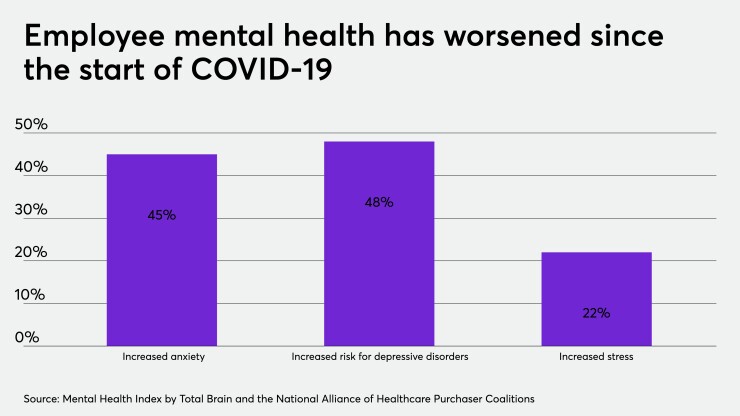The seismic impacts of the global pandemic required organizations to rapidly adapt to the changing nature of work. Pandemic-driven shifts in working norms, including remote working and an emphasis on employee health and safety, will continue to shape the future of work in 2021 and beyond. Organizations navigating new working norms must evolve workplace strategies to help employees stay healthy, engaged and productive.
Moving into 2021, companies are taking a more holistic approach to the employee experience, embracing strategies geared toward improving employee well-being and
Supporting employee wellness and mental health
The pandemic has taken a
Employers recognizing this are increasingly investing in mental health initiatives that address issues such as employee stress, burnout and anxiety. Analyst firm Gartner noted that the COVID-19 pandemic brought well-being to the forefront making employers more aware of the impact of mental health. The firm found that by late March 2020,
Read more:
These mental health and wellness programs include providing counseling resources, offering mental health days, hosting virtual yoga, Pilates and meditation classes, increasing healthcare benefit programs and allowing flexible work schedules.
Employee mental and physical health has bottom-line implications for organizations, impacting everything from job performance to productivity and retention to employee engagement.
Gartner’s 2020 ReimagineHR Employee Survey
Expanding flexible working policies
Employers are rethinking strategies for how work gets done, providing flexible working arrangements that allow their employees to care for children and elderly family members, eliminate commute times and reduce commuting costs.
Remote working is expected to remain in the way work gets done long after the pandemic. In fact, a report by Verizon Business found that
Job seekers who experienced the benefits of pandemic-driven remote working now expect flexible working policies to be a part of the employee experience offered by potential employers. Employers are responding by adopting flexible and remote working arrangements, with
Gartner
Creating activities that connect and engage employees
With remote working reshaping working paradigms, organizations are finding a need to develop activities that help ensure employees remain motivated and productive at work. According to the
Read more:
Providing opportunities that allow coworkers to interact are helping organizations create a more connected, engaged and satisfied workforce which can translate to better business performance. Gallup
Companies are fostering a sense of community and connectedness by hosting virtual happy hours and scavenger hunts, setting up office-wide wellness challenges and establishing mentoring programs that connect more senior staff with less experienced colleagues. They are also encouraging company-wide volunteer and charitable activities that can be implemented virtually such as making cards for hospitals to distribute to their patients or shopping online for school supplies to donate to children who need them.
Organizations are using these and other activities to help employees feel less isolated, create a positive company culture and increase employee engagement.
The global pandemic is having a transformational impact on the workplace that will last well into 2021 and beyond. To successfully move forward and adapt to the future of work, companies will need to invest in employee mental and physical health programs, meet employee expectations for flexible working policies and provide the connected experiences that increase employee engagement and productivity.






